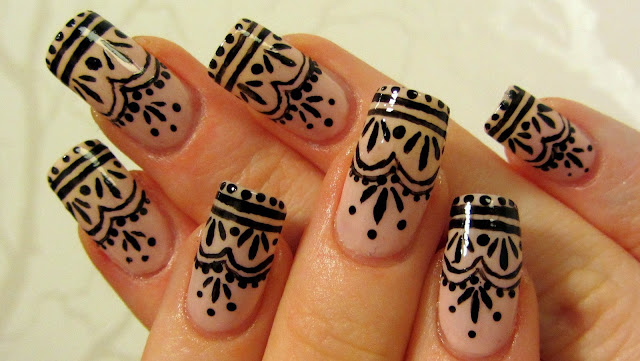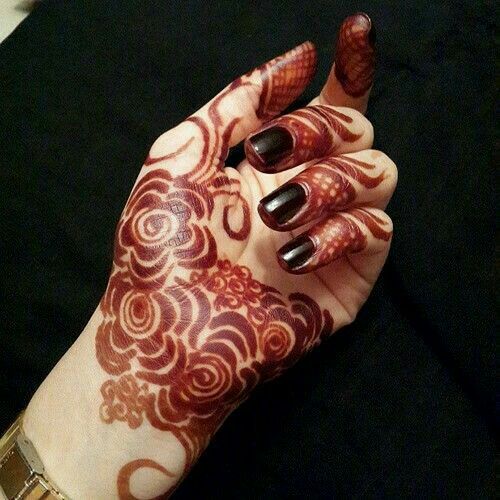Are Unhealthy Nails Getting in the Way of Your Mehndi Designs? Here's What To Do!
One of the most unique trends today is mehndi nail art, the ingenious and very detailed application of henna to the nail above a coat of polish.
To get the most out of the art form, the nails are typically kept long with square, almond, or stiletto tips, or reinforced with false nails. The nails are treated and polished as normal, and then done over with henna in traditional designs. The result is striking, distinctive, and will guarantee that no one will be able to take their eyes off your graceful fingers!
But what happens
when drawing attention to your hands isn’t the best idea because your nails are
looking worse for the wear? Here are five signs of unhealthy nails that you
might encounter, and what to do to get your nails back to mehndi-ready
shape!
Dry, brittle nails
The Cause: Frequent exposure to harsh chemicals such as
cleaning products, often combined with having your hands submerged in water for
prolonged periods of time, such as when doing the laundry, washing dishes, or
swimming in chlorinated water.
The Effect: Dry and brittle nails that are prone to cracking
and splitting are the last place you would probably attempt nail art of any
kind. The mehndi isn’t going to take to the rough surface of your nail, and it
will likely be too fragile to hold falsies as well.
What to Do: Go easy on your hands! While housework is
unavoidable, as much as possible, wear gloves when doing chores that involve
chemicals like bleach or lye. Always moisturize after a day at the pool or
doing chores, and pay special attention to your cuticles. When doing your
nails, avoid acetone-based nail polish remover, and use a hydrating basecoat
before manicures. Lastly, increase your vitamin intake to strengthen your nails
as they grow back.
Pitting of the nails
The Cause: A chronic skin disease called psoriasis caused
by an overactive immune system that makes the skin red, inflamed, and covered
with silvery-white scaly patches. Half of the people with psoriasis of the skin
also get psoriasis of the nails.
The Effect: Pits on the nails ruin mehndi designs as the
surface of the nail becomes rutted and irregular. The degrees of pitting
vary—some nails may have only one pit while others have several, and they can
be either shallow or deep. In some cases, there may even be pain, or separation
of the nail from the nail bed. Ouch!
What to Do: Nail psoriasis can be challenging to treat, as
the disease targets the nails as they grow, so you'll need to see a doctor.
Your doctor may recommend a steroid cream for your nails or phototherapy with
UV light. Psoriasis can be triggered by stress, so look into relaxation
techniques to prevent it from recurring in the future.
Clubbing of the nails
The Cause: Clubbed nails are a symptom of low oxygen in the
blood. A number of heart and lung conditions can be the cause, but this is
commonly the case with long-time smokers. Because there’s less oxygen to go
around, distant areas like the fingertips compensate by forming new tiny blood
vessels, making them swell and club.
The Effect: The ends of the fingers become large and bulbous,
and the nails curve downward—which doesn’t bode well for falsies! The tar and
nicotine in cigarettes also turn nails yellow and brittle, which doesn’t make
for a good canvas for mehndi nail art.
What to Do: As clubbing of the nails is a symptom and not a
condition itself, no specific treatment exists for it. What you need to do is
discover the underlying heart or lung condition that’s causing the oxygen
deficiency, and treat that.
Clubbing is a
change that happens gradually over time, and once the excess tissues at the
ends of your fingers have set in, there’s no going back. The important thing is
to catch clubbing of the nails early to increase chances of reversal.
And it’s always a
good idea to avoid smoking altogether!
Spoon-shaped nails
The Cause: Spoon-shaped nails most commonly occur due to
iron deficiency anemia. In some cases a liver disorder called hemochromatosis
can also cause spooning, in which case too
much iron is absorbed by the body.
The Effect: The ends of the nails curve upward and a concave
depression forms in the main part of the nail, typically deep enough to hold a
drop of water! The uneven surface won’t do much for holding a mehndi nail art
pattern though.
What to Do: See a doctor and get your blood iron levels
tested. If you do have iron deficiency anemia, you can boost iron in your diet
by eating red meat, dark green leafy vegetables, and seafood. Your doctor may
also prescribe iron supplements (best taken with meals and lots of water!).
Nail biting
The Cause: Nail biting occurs across people of all ages.
It's one of those unconscious habits the body turns to when under stress, like
picking at the skin around the nails or pulling out hair. In this way, it’s a
sign and a response to anxiety.
The Effect: Mehndi nail art is at its best when it’s
well-spaced and balanced, a look that requires long, smooth nails. Nails bitten
down to the quick will make nail art look cramped. Over time, your nails could
develop bumps, ridges, and other deformities.
Not to mention,
when you bite your nails, you’re also putting the dirt under them into your
mouth, which is very unhygienic and could make you sick!
What to Do: The good news is, this nail art problem can
actually be solved with more nail art! Keep your nails regularly painted to out
to discourage you from biting them—nail polish makes nails taste bad, and
you’re less likely to destroy something pretty and expensive.
As nail biting is
a nervous habit, the best way to kick it for good is to find healthy ways to
address anxiety. Try out relaxation techniques like deep breathing and yoga to
calm you down and help you reflect, and carry a fidget cube if you need to
divert your attention from your nails in idle moments.
Psychologists
would say that a person who minds their nails is a person who pays close
attention to details. Which, for those of us who love the intricate, minute,
precise details of mehndi nail art, is nothing but the truth!
On a deeper
level, your nails are more than just a platform for your favorite beauty trend,
they’re an indicator of the state of your physical and mental health. Paying
attention to the signs your nails reveal and learning to interpret them won’t
just improve your skills at mehndi, they might even save your life.
Refrences:
http://www.thebridalbox.com/articles/nail-mehndi-designs_0049133/
http://www.healthline.com/health/nail-abnormalities-2#nail-care3
https://www.allure.com/story/chlorine-and-effects-on-skin
http://www.webmd.com/skin-problems-and-treatments/psoriasis/psoriasis-types
http://www.calmclinic.com/anxiety/symptoms/nail-biting
About The Author: M Pimentel
M is a happily married Filipino mother to three wonderful little daughters, ages: 8 years, 5 years, and 4 months old. Her daily life is a struggle between being the Executive Content Director for Project Female and deciding who gets to watch television next. She specializes in creating and editing content for female empowerment, parenting, beauty, health/nutrition, and lifestyle. As the daughter of two very hardworking people, she was brought up with strict traditional Asian values and yet embraces modern trends like Facebook, vegan cupcakes, and the occasional singing cat video. mpimentel@expertlinked.com









